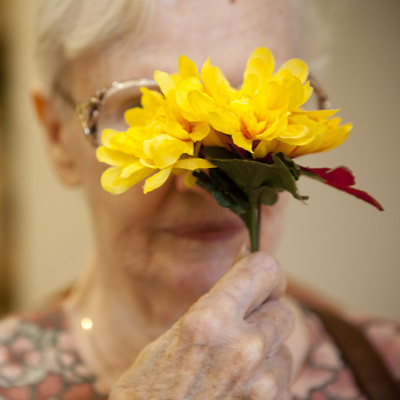To an Alzheimer’s patient, the confusing world of Shakespeare’s A Midsummer Night’s Dream may seem more like their reality than we know it. For patients and carers, the idea of embarking on a project that lasts more than a day may seem impossible, but the documentary film Still Dreaming highlights the benefits that a long-term project can have on elderly citizens dealing with not just Alzheimer’s, but also dementia, depression, and the many physical effects of aging.
Hank Rogerson and Jiliann Spitzmiller, the team behind Shakespeare Behind Bars, sent their newest project into the Lillian Booth Actor’s Home in New Jersey to film the production of a unique version of A Midsummer Night’s Dream with members of this community of ex-actors, writers and musicians. The chaos of the six-week project, run by young New York theatre directors Ben Steinfeld and Noah Brody, with disruptions, set-backs and last-minute subs, is all captured in this feature-length documentary.
The ways that the film interacts with the play’s themes are what make it so interesting. We learn through the film that one main cast member has Alzheimer’s and others are dealing with mental and physical ailments of their own. With these revelations, the film grows confusing and mysterious for the characters in it and for the audience, too. With one cast-member utterly convinced that she is moving to Arizona halfway through rehearsals, and another needing to back out due to a painful hip operation, directors Ben and Noah (much like the play’s Peter Quince) have to struggle to make sense of the unruly and quickly disappearing cast.
As director Ben says once in the film – for Shakespeare’s characters, the events that seem funny to us are painfully frightening and disorienting. As we laugh at the quips and moans of this elderly community, we inhabit the world of their confusion, creating, by virtue of Midsummer Night’s Dream’s plot, a play-within-a-play-within-a-play, with themes muddling and mixing between each. If you find that hard to follow, imagine being a part of it.
Even more complex is the way these actors embody the characters they play. As reviewed in Variety, the outspoken Dimo Condos “practically incarnates Oberon” while “Charlotte Fairchild, whose energetic enthusiasm fairly effervesces, seems born to play Puck”. Dimo’s outstanding ego overshadows the other actors, particularly amateur actor Lynette Loose – appropriately playing Hermia.
The climax of the film happens when Dimo (Oberon) condescendingly lectures Lynette (Hermia) on how to play her role, a dynamic that makes it difficult to see where the acting stops and their true personalities begin. The reality is even sadder when we learn that Lynette spent most of her life in an arranged marriage with a man she didn’t love—cast as Hermia for her acting, Lynette’s story turns out to bear an eerie resemblance to the life that might have been for Hermia.
The actors walk through local gardens reciting lines, forgetting lines, and entwining themselves in the lives of the characters they portray. As they finish the production, they reflect on how they’ve learnt and grown from the experience. Members who were suffering from long-term depression no longer need their medication, Charlotte remembers most of her lines and cues despite her Alzheimer’s, and the stubborn Mary DePaulo appreciates the hours she felt she was “wasting” all those weeks ago. The team, as they now are, have been freed from the spell of old age and can see clearly. Physical and mental issues aside, the home (both its members and its staff) escapes the chaos of the past six weeks, leaving with it some of the burdens they were living with before.
While the course of aging never did run smooth, it appears it might run a bit smoother with a little help and creativity from Shakespeare and his friends. And it’s not untrue that the act of doing something creative can have a profound effect on Alzheimer’s, depression, and more. In a post-film audience discussion, Rogerson and Spitzmiller talked about Creative Aging, a number of programs across the US that use the arts as a tool for healthy and happy aging. The Bard’s words, when not confined to the professional stage, may prove more helpful than just to provide a few laughs and intellectual stimulation.

